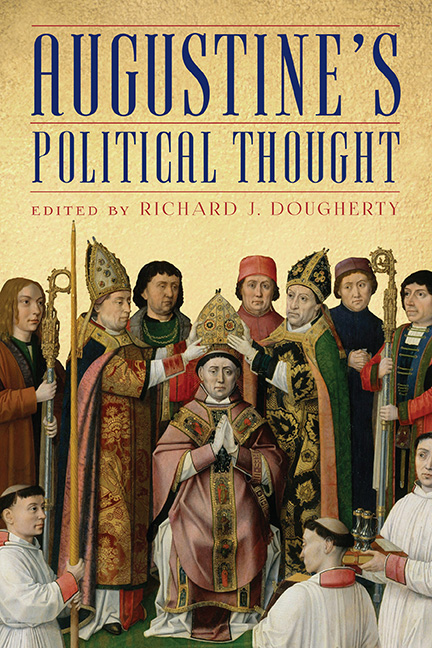Book contents
- Frontmatter
- Contents
- Acknowledgments
- Introduction
- Part 1 Politics, Nature, and Virtue
- 1 St. Augustine and the Problem of Political Ethics in The City of God
- 2 The Other Happy Life: The Political Dimensions to St. Augustine's Cassiciacum Dialogues
- 3 Peace in the Order of Nature: Augustine, Giles, and Dante
- 4 Deeds and Words: Latreia, Justice, and Mercy in Augustine's Political Thought
- 5 The Investigation of Justice in Augustine's Confessions
- Part 2 St. Augustine and Ancient Political Philosophy
- Notes on Contributors
- Index
5 - The Investigation of Justice in Augustine's Confessions
from Part 1 - Politics, Nature, and Virtue
Published online by Cambridge University Press: 26 June 2019
- Frontmatter
- Contents
- Acknowledgments
- Introduction
- Part 1 Politics, Nature, and Virtue
- 1 St. Augustine and the Problem of Political Ethics in The City of God
- 2 The Other Happy Life: The Political Dimensions to St. Augustine's Cassiciacum Dialogues
- 3 Peace in the Order of Nature: Augustine, Giles, and Dante
- 4 Deeds and Words: Latreia, Justice, and Mercy in Augustine's Political Thought
- 5 The Investigation of Justice in Augustine's Confessions
- Part 2 St. Augustine and Ancient Political Philosophy
- Notes on Contributors
- Index
Summary
In this essay, I consider Augustine's account in the Confessions of his investigation of justice, especially his short discourse on “true, inner justice.” We are fortunate in the case of Augustine to have his autobiography to help us retrace the steps of his intellectual and spiritual career. As I argue below, this discourse on justice has a unique place in the narrative of the Confessions and presents itself as a summary of Augustine's mature understanding of justice. It indicates the elements of that understanding and marks out for the reader the paths he took to arrive at it. In doing so it raises certain questions and points not only to the later books of the Confessions but also, through textual allusion, to Augustine's early dialogue On Free Choice, where he says the deeper reasoning behind the view sketched in the Confessions is to be found. Considering the continued difficulties in ascertaining his moral and political philosophy, this discourse and its context, which have not received much attention, should be of interest to students of Augustine as a way of framing our consideration of his thought.
The discourse on justice occurs in the context of Augustine's recounting of his first association with the Manichaean sect, in which he mentions the difficulties that caused him to prefer that sect for nine years. In addition to the well-known difficulties regarding the origin of evil and God's spiritual nature, Augustine says that the morality of the Old Testament and the justice of the patriarchs were a stumbling block that he could not accept until he came to understand “true, inner justice.”There follows a discourse on the view of justice that Augustine would come to know and that enabled him to accept the Old Testament. Following Augustine's definition of justice, the discourse falls into two parts. Its first, introductory part7 consists mostly of a series of analogies that shed light on the nature of Augustine's youthful error and on the true character of justice. Clarifying justice “from below,” as it were, these analogies broaden our sense of what true justice is by appealing to certain everyday experiences of what is suitable, fitting, or proper.
- Type
- Chapter
- Information
- Augustine's Political Thought , pp. 105 - 126Publisher: Boydell & BrewerPrint publication year: 2019

